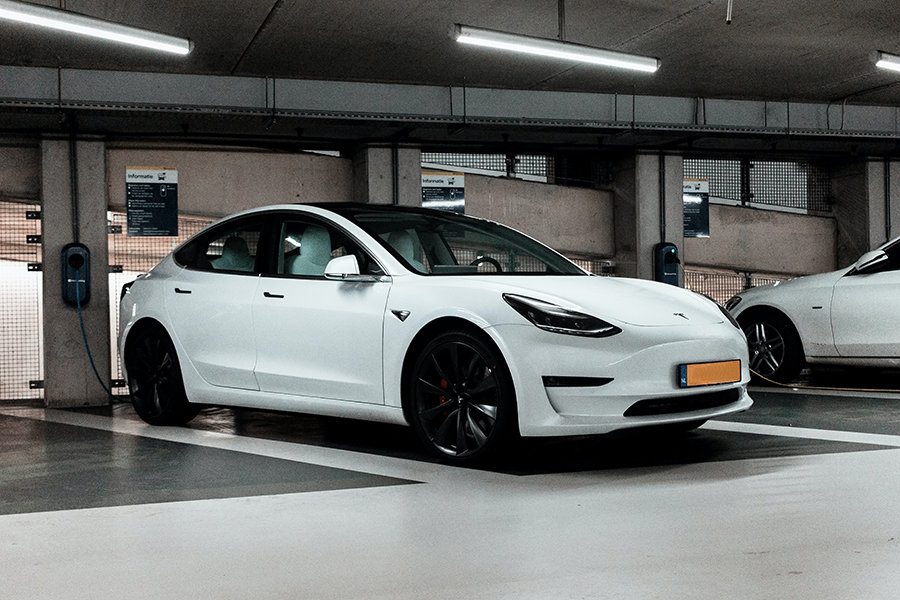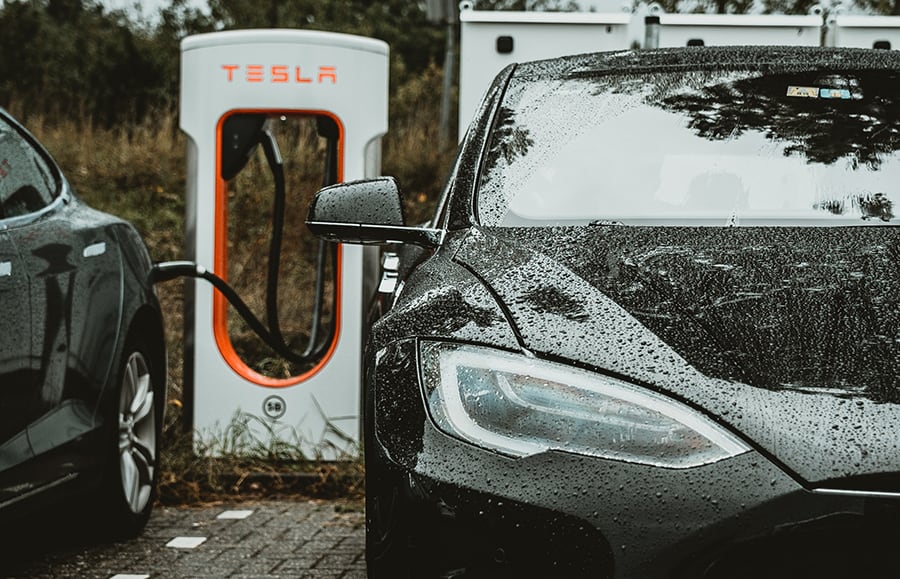How much does it cost to charge a Tesla? It ranges from about $8 to $18 to fully charge a Tesla, depending on the model vehicle you drive.
To understand the cost range, we’ll go over the cost of charging the different Tesla vehicle models. While also going over the many variables you need to consider when it comes to the charging cost.
This way, you can calculate your charging costs no matter your vehicle’s circumstances. First, though, we’ll go over the calculation to fuel a gas-powered vehicle. You can then directly see the cost savings of an electric vehicle.
Fuel cost calculation of gasoline-powered vehicles
Estimate how many miles you’ll drive in a year. Then, divide this figure by the miles per gallon of your vehicle and multiply it by the current price of gas.
![]() = Annual fuel cost
= Annual fuel cost
As an example, we’ll look at a typical everyday 2021 Honda Accord. This car is fairly equal to a Tesla Model 3 in both size and price. It has a combined gas mileage of 33 Miles Per Gallon (MPG), with a base price of $24,770.
In our calculation, we’ll assume you drive 13,500 miles per year. This is the average number of miles driven per year in the U.S. according to the U.S. Department of Transportation.
![]() = $1,046.86 per year
= $1,046.86 per year

Important Note: The U.S. Department of Energy uses the term “eGallon.” eGallon is the cost of electricity to “fuel” a electric vehicle, compared to a similar gas-powered vehicle.
The following data from Choose Energy compares price per gallon versus price per eGallon:
| State | Price per gallon | Price per eGallon | Cost difference |
|---|---|---|---|
| California | $3.91 | $1.86 | $2.05 |
| Colorado | $2.90 | $1.10 | $1.80 |
| Florida | $2.86 | $1.08 | $1.78 |
| Hawaii | $3.69 | $2.65 | $1.04 |
| New York | $2.91 | $1.66 | $1.25 |
| Texas | $2.60 | $1.08 | $1.52 |
| Washington | $3.33 | $0.89 | $2.44 |
To understand these figures, let’s use California as an example. For $1.86 worth of electricity, you can drive an equal distance as you would using $3.91 worth of gasoline. On average, you can see the cost to charge a vehicle is 50% less than paying for gasoline.
Charging cost calculation for electric-powered vehicles
We’ll use the price per kilowatt-hour (kWh) versus the price of a gallon of gas, in our calculation. While we express the battery capacity of an electric vehicle in terms of kWh.
According to Nationwide, the average electricity rate was 13.7 cents per kWh in February 2021. To put this cost into perspective, the below table compares average energy prices in the U.S.
| Date | Gasoline cost per gallon | Electricity cost per kWh |
|---|---|---|
| March 2020 | $2.334 | $0.134 |
| April 2020 | $1.946 | $0.133 |
| May 2020 | $1.946 | $0.134 |
| June 2020 | $2.141 | $0.137 |
| July 2020 | $2.243 | $0.137 |
| August 2020 | $2.245 | $0.137 |
| September 2020 | $2.260 | $0.137 |
| October 2020 | $2.228 | $0.135 |
| November 2020 | $2.159 | $0.136 |
| December 2020 | $2.235 | $0.136 |
| January 2021 | $2.235 | $0.136 |
| February 2021 | $2.559 | $0.137 |
Using this information, we can calculate the charging cost.
Cost of charging calculation for the Tesla Model 3

The rated miles per kWh for the standard Tesla Model 3 is 4.17 miles per kWh. Again, we’ll assume you drive 13,500 miles in a single year.
![]() = 3,237.41 kWh of electricity
= 3,237.41 kWh of electricity
Next, we multiply our result by the cost per kWh to calculate the total annual cost.
3,237.41 kWh x $0.137 per kWh = $443.53
So compared to the annual cost of a gasoline-powered car, the energy cost savings is $1,046.86 – $443.53 = $603.33!
If you live in California with higher gasoline prices, your cost savings will be even greater.

Important Note: The charging cost varies, on the charger station type you use. There’s typically a tradeoff between charging speed and charging cost.
Cost of charging calculation for all Tesla vehicle models

We’ll use the Tesla vehicle battery sizes in our calculation from the Electric Vehicle Database.
To illustrate, a standard Tesla Model 3 has a 50 kWh battery. Also, a Level 2 home charger has an approximate efficiency of 87%. So you’ll need a bit over 1 kWh of energy to charge a 1 kWh battery.
Now, (50 kWh / 0.87) x $0.137 per kWh = $7.87 is the cost to fully charge a standard Tesla Model 3. And listed in the table below, are the charging costs for the other Tesla model vehicles.
| Tesla model vehicle | Battery usable | Range | Fully charge cost | Cost per mile |
|---|---|---|---|---|
| Model 3 (Standard Plus) | 50 kWh | 263 miles | $7.87 | $0.030 |
| Model 3 (Long Range) | 82 kWh | 353 miles | $12.91 | $0.037 |
| Model 3 (Performance) | 76 kWh | 315 miles | $11.97 | $0.038 |
| Model S (Long Range) | 90 kWh | 412 miles | $14.17 | $0.034 |
| Model S (Plaid) | 90 kWh | 390 miles | $14.17 | $0.036 |
| Model S (Plaid+) | 115 kWh | 520 miles | $18.11 | $0.035 |
| Model X (Long Range) | 90 kWh | 360 miles | $14.17 | $0.039 |
| Model X (Plaid) | 90 kWh | 340 miles | $14.17 | $0.042 |
| Model Y (Long Range) | 72.5 kWh | 326 miles | $11.42 | $0.035 |
| Model Y (Performance) | 72.5 kWh | 303 miles | $11.42 | $0.038 |

Important Note: The battery range isn’t fixed. The actual driving range depends on the following factors:
- Speed
- Style of driving
- Weather
- Route conditions
- Usage of heating and air conditioning
- Battery condition
Figuring out your kWh (electricity) cost at home

Take a look at your monthly electricity bill to see the rate you’re paying. You’ll then know how much it’ll cost to charge your Tesla vehicle at home.
The above image is a typical electricity bill. What I’ve boxed in red is the rate you need to use in your charging cost calculation.
Just as important, find out when off-peak times are in the day for you. By taking advantage of these hours, you’ll utilize cheaper rates.
Solar-powered home cost of savings
If you have solar panels installed, your cost of electricity will drop substantially. We’ll do the math to see the cost savings.
A 15kW system costs about $20,000 after $10,000 of tax credits and $10,000 in rebates.
You’ll produce about 20,000 kWh of energy per year or 600,000 kWh over the next 30 years. Then to account for system degradation, we’ll multiply our energy result by 0.08% x 30.
This calculates to 600,000 – (600,000 x 0.024) = 585,600 kWh over the next 30 years.
So your electricity cost is $20,000 / 585,600 kWh = $0.034/kWh. Let’s now revisit the cost of charging some of the Tesla vehicles we calculated earlier. The following table compares the charging costs with and without solar:
| Tesla Model Vehicle | Fully charge cost (no solar) | Fully charge cost (solar) | Cost per mile (no solar) | Cost per mile (solar) |
|---|---|---|---|---|
| Model 3 (Standard Plus) | $7.87 | $1.95 | $0.030 | $0.007 |
| Model S (Long Range) | $14.17 | $3.52 | $0.034 | $0.009 |
| Model X (Long Range) | $14.17 | $3.52 | $0.039 | $0.010 |
| Model Y (Long Range) | $11.42 | $2.83 | $0.035 | $0.009 |
Without a doubt, your charging costs are much cheaper if you have solar panels installed. Keep in mind though, electricity prices do fluctuate. But using our approximate calculation, you can still clearly see the cost savings.
Cost of charging calculation for Tesla Supercharger
Another option is to use Tesla Supercharging. Go here and select the state you’ll charge your car in to check your charging cost.
As a comparison, the following is the cost to fully charge a standard Tesla Model 3:
- Charging at home (no solar): (50 kWh / 0.87) x $0.137 per kWh = $7.87
- Supercharging: (50 kWh / 0.87) x $0.26 per kWh = $14.94
Now, the per-mile cost for a standard Tesla Model 3 is:
- Charging at home (no solar): $7.87 / 263 mile range = $0.030 / mile
- Supercharging: $14.94 / 263 mile range = $0.057 / mile
The cost to charge at home is definitely cheaper, unless you get free supercharging of course.

Important Note: Since 2017, Tesla has stopped subsidizing the Supercharger network. The network needs to be self-sufficient, allowing for better expansion and upgrades without reducing the profitability of car sales.
We’ll revisit the 2021 Honda Accord, to compare the cost of driving 562.4 miles. It has a gas tank size of 14.8 gallons with a highway gas mileage of 38 MPG. We’ll use the national gas and electricity cost averages from February 2021.
- Honda Accord: 14.8 gallons x 38 MPG = 562.4 miles costing $37.87 (14.8 gallons x $2.559 per gallon)
- Tesla Model 3: 562.4 miles x $0.057 per mile= $32.06
So for long-distance driving, a Supercharger doesn’t save you much money. In certain states, it may even be more expensive depending on the gas-powered car you drive.
“How much does it cost to charge a Tesla?” wrap up
Electric cars are far more energy-efficient than gasoline-powered cars. Through our calculations, you’ll save about $600 every year by driving a Tesla versus a Honda.
According to Car Insurance, Americans on average keep their cars for about 11 years. So this is a total savings of around $6,600 if you buy a Tesla!
Just be sure to calculate all your costs, as the energy market is constantly fluctuating. You want to be sure you’re comparing apples to apples.
How much do you pay to charge your Tesla vehicle at home every month? Would you ever go back to a gasoline-powered car as a current Tesla owner? What are your thoughts on electric vehicles compared to gasoline-powered vehicles?
Featured Image Photo Credit: Andreas Dress (image cropped)

Author Bio: Koosha started Engineer Calcs in 2019 to help people better understand the engineering and construction industry, and to discuss various science and engineering-related topics to make people think. He has been working in the engineering and tech industry in California for well over 15 years now and is a licensed professional electrical engineer, and also has various entrepreneurial pursuits.
Koosha has an extensive background in the design and specification of electrical systems with areas of expertise including power generation, transmission, distribution, instrumentation and controls, and water distribution and pumping as well as alternative energy (wind, solar, geothermal, and storage).
Koosha is most interested in engineering innovations, the cosmos, sports, fitness, and our history and future.
